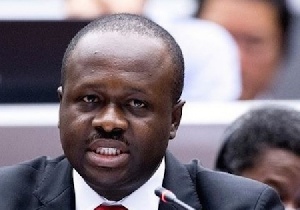Business News of Tuesday, 2 September 2014
Source: B&FT
Gov't loses US$50 million to fraudsters
The activities of SIMBOX fraudsters have led to the loss of over US$50 million in taxes to government, Minister of Communication Edward Omane Boamah has said.
Mr. Omane Boamah revealed this after officials of the Criminal Investigations Department (CID) of the Ghana Police Service arrested some fraudsters at Dome Pillar 2, a suburb of Accra.
The activities of the criminals at Dome Pillar 2 alone have cost the country in excess of US$800,000.
SIMboxing
SIMboxing technology is used when alternative routes are employed to bring international telephone traffic into the country without passing through the registered international gateways.
Because these are not official and unregistered they do not pay relevant fees and taxes. They also divert revenue from the telcos to their private accounts and those of their collaborators both inside and outside the country.
The illegal by-pass is done by illegal operators who use a device called SIMBOX, which can accommodate from 4 to 50,000 SIM cards. The SIMBOX converts international calls it receives through the internet to convert and present these as local calls to the receiving public.
The availability of high speed internet as well as unregistered SIM cards facilitate the business of SIMBOXing.
Through the activities of the illegal operators, the international telephone traffic that reached nearly 100 million minutes per month with the introduction of International Gateway Monitoring framework by the National Communications Authority (NCA), has plummeted to less than 60 million minutes per month.
“If we consider that six cents is contributed on every call per minute to the Consolidated Account of government to be used for national development then we can do our own calculations of what is lost through the activities of the fraudsters at the end of every month.
“You can see from the evidence that there is always collusion with external interests to defraud our system. The exercise by our Security Agencies should therefore send a message that we are also prepared for them. We shall chase them and smoke them out of the ‘holes’ in which they are hiding,” the Minister said.
Curbing the act
The government in 2009 passed the Electronic Communications (Amendment) Act, Act 786 to provide a minimum rate of international incoming electronic communication traffic and for related matters.
The minimum rate was established to support the stability and profitability of the Ghana market and also to protect the operating service providers from folding up their operations and laying off workers.
The action was to compel international telephone traffic to pass through the existing licensed international gateways and pay appropriate termination rates to the telecom operators. This would in effect increase the volumes of traffic and also improve revenue earnings for the companies.
“To improve the eco-system therefore, I am happy to inform that Government has approved four new policies to introduce four new licences to regulate emerging value-added services.
“These licences are: INTERCONNECT CLEARING HOUSE LICENCE: with a potential to control the incidence of by-pass of incoming international telephone traffic to the country. International Wholesale Licence; Unified Access Service Licence and Mobile Virtual Network Operations Licence (MVNO), the Minister added.
The introduction of these new licences, according to OmaneBoamah, will expand the range of value-added, services, especially the introduction of premium services by third party content providers.
“With these policy guidelines, and others in the pipeline, it is our expectation that the communications landscape will respond to the challenges, including the SIMBOXing menace and ensure that it opens up the opportunities for national development and local entrepreneurship,” he said.











